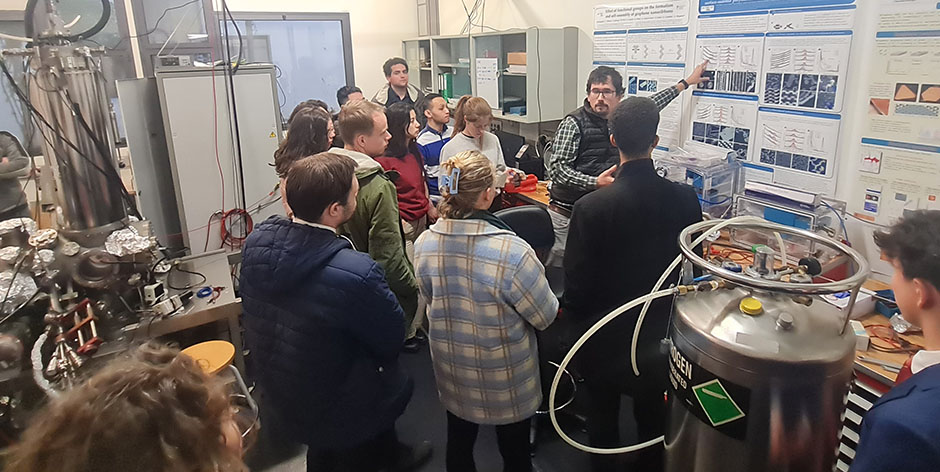Friday, 10 February 2023
Nanobiology students from delft University of Technology visit ICN2 and ICMAB
A group of 30 students from the Nanobiology program at Delft University of Technology visited the ICN2 and ICMAB. The students, who are part of the study association for Nanobiology Hooke, visited several research groups and facilities to gain insight into real-world applications of their interdisciplinary field. The group received presentations from researchers on topics including atomic manipulation, nanobiosensors for disease diagnosis, hydrogels for cancer immunotherapy, and nanomedicine.

A delegation of 30 students from the Study Association for Nanobiology Hooke, at the Delft University of Technology and the Erasmus Medical Centre Rotterdam, visited today the ICN2 and ICMAB as part of an international study trip focused on Nanobiology. The trip was organized by the Nanobiology study trip committee for Master and third-year Bachelor students. Nanobiology is a growing interdisciplinary field that blends physics and mathematics to study the complexities of biology.
The aim of the visit was to expose the students to real-world applications of the subjects covered in their Nanobiology program, provide them with ideas for future internships and jobs, and help build their professional networks. The students were given a brief institutional presentation by Àlex Argemí, ICN2 Head of Marketing and Communication, before visiting the ICN2 Atomic Manipulation and Spectroscopy Group, where they learned about Lab Engineer Marcos Paradinas' research using scanning tunneling microscopes that allow for the visualization and interaction with matter at the atomic scale.
The students also visited the ICN2 NanoBiosensors and Bioanalytical Applications Group, where Dr Patricia Ramírez, Dr Olalla Calvo and other members of the group demonstrated their cutting-edge nanobiosensors for diagnosing various diseases. They then traveled to the ICMAB where they visited the Nanomol-Bio Lab, where Dr Judith Guasch her colleagues focus on hydrogels for T cell growth for cancer immunotherapy and organoid development. They also enterd the Soft Materials Lab, where they were received by David Piña, a technician working on nanomedicine.
The visit concluded back at the ICN2 with a presentation by Pablo Pomposiello, ICN2 Head of Business and Innovation, who shared ideas about technology transfer and spin-off creation and sparked a discussion on different innovation models in various European countries. The members of the student association expressed their gratitude for the high-quality presentations and enthusiasm shown by the researchers during the visit, which was deemed highly successful by all involved.

